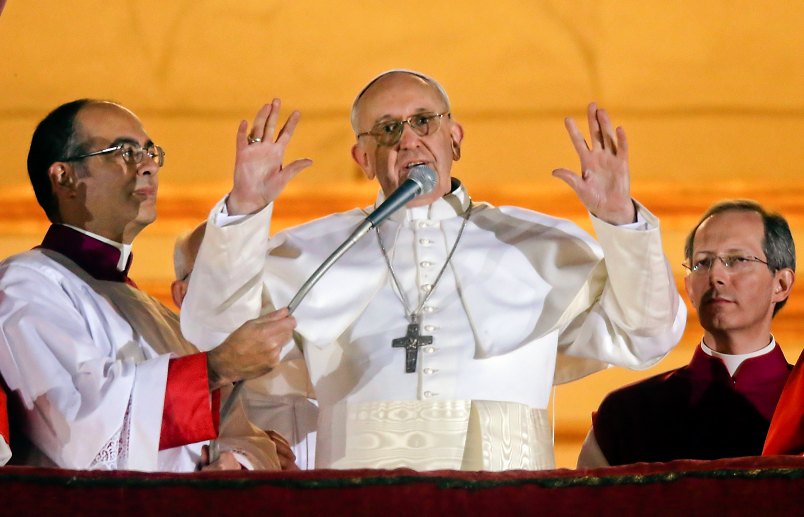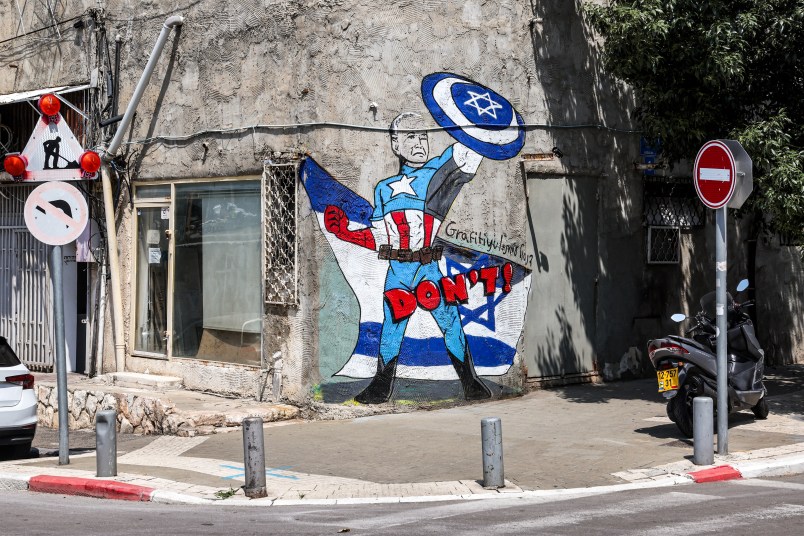Part 2 from TPM Reader TF …
I am a progressive, non-traditionalist Catholic, which makes me a little unusual because most of the people like me have left the Church deliberately or have drifted away. Francis was not first on my list of picks for Pope (like I get a vote or something!), but he was among the top few. The reason has nothing to do with the label “progressive” or “traditional” because I didn’t know anything about his real positions. He looked to be a bit conservative for my tastes, but they all are in the wake of John Paul II and Benedict.
The reason he was high on my list had to do with a term that appears in your quote from him: “pastoral.” (The other term that fascinated me with his potential selection, and I think is vastly under-rated in these discussions, is: “Jesuit.”) I figured more in hope than actual knowledge, that a Latin American who spent real time among his people (who was pastoral) would at least be less regal than Benedict. I long since gave up on a church that would be open-minded about gays and lesbians, much less about abortion. I could elaborate on taking these issues out of context since my days in Catholic high school in the 70s, but it would serve no purpose beyond what you already said.
I have been enormously and pleasantly surprised because I didn’t expect a whole lot from this humble man who was elevated to Pope, and certainly not within one year. I now have hope that I have not since John Paul I was appointed. Changes in doctrine aren’t what we need right now, we need an understanding of reality. Every pick of mine had pastoral experience: they all worked to bring people into the Church while dealing with real-life, messy situations.
So without further pontification (pun intended) from me, I think that doctrinal issues will take care of themselves for reasons stated in an article that appeared in National Catholic Reporter a couple of months ago, before Francis started really freaking people out (citing THAT publication gives me away, of course):
“Will this pope rewrite controversial church doctrines? No, but that isn’t how doctrine changes. Doctrine changes when pastoral contexts shift and new insights emerge such that particular doctrinal formulations no longer mediate the saving message of God’s transforming love. Doctrine changes when the church has leaders and teachers who are not afraid to take note of new contexts and emerging insights. It changes when the church has pastors who do what Francis has been insisting on for the last six months: Leave the security of your chanceries, rectories, parish offices and episcopal residences. Set aside the ‘small-minded rules’ that keep you locked up and shielded from the world. Go meet the people where they are.”
http://ncronline.org/news/vatican/francis-wishes-release-vatican-iis-bold-vision-captivity
For me, as a Catholic who has been frustrated for decades, the words “new insights emerge such that particular doctrinal formulations no longer mediate the saving message of God’s transforming love,” though stilted and difficult, drive at the heart of the Church’s existing problems and the potential solutions. Pope Francis has said many times in many ways, “meet the people where they are.” Is that Catholic enough for you?
In case it is not, anyone can draw a straight line in social thinking from at least John XXIII through to Francis, including John Paul II and Benedict. That won’t provide much comfort to the conservatives, because they ignored that part of the thinking of the last two Popes. Francis’s emphasis on social doctrine and style are different from his two predecessors, which rankles conservatives who want to emphasize stuff like birth control (already disregarded by something like 99 percent of Catholics); he has no traditionalist sentiments, which bugs some of those folks.
But you hit the important point: this is more than a change in emphasis and style. What is going on is not conservative versus liberal or traditionalist versus reformist. Pope Francis has already shown that he doesn’t think in those terms, doesn’t even care about those terms. Vatican II came about because a Pope looked at a church and saw it completely out of touch with the world in which it was trying to exist. He believed that to be wrong. Francis sees that too. He also gets a power-boost from his relentless driving message about service to others, which is at the core of being a Jesuit. (I have a daughter at a Jesuit University and service to others fairly screams from her campus.) I have no idea what Pope Francis will change, but I already have real hope that it will be good, whether or not I approve.
This Church is going to move now; it needed forward motion more than a resolution of all the petty stuff that has been bugging progressive non-traditionalist Catholics. I am not giddy about liberalism, I am realistic about what happens when someone suddenly adds force to a body at rest.







